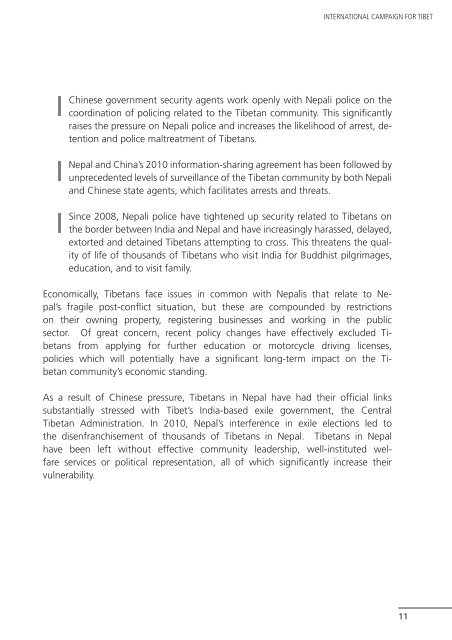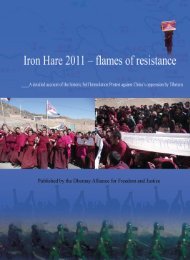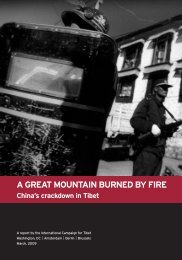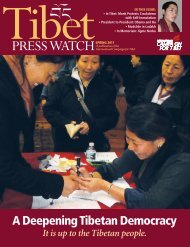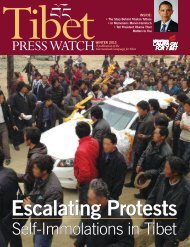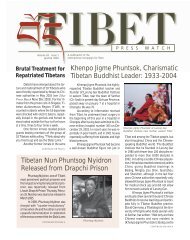DANGEROUS CROSSING: - International Campaign for Tibet
DANGEROUS CROSSING: - International Campaign for Tibet
DANGEROUS CROSSING: - International Campaign for Tibet
Create successful ePaper yourself
Turn your PDF publications into a flip-book with our unique Google optimized e-Paper software.
INTERNATIONAL CAMPAIGN FOR TIBET<br />
Chinese government security agents work openly with Nepali police on the<br />
coordination of policing related to the <strong>Tibet</strong>an community. This significantly<br />
raises the pressure on Nepali police and increases the likelihood of arrest, detention<br />
and police maltreatment of <strong>Tibet</strong>ans.<br />
Nepal and China’s 2010 in<strong>for</strong>mation-sharing agreement has been followed by<br />
unprecedented levels of surveillance of the <strong>Tibet</strong>an community by both Nepali<br />
and Chinese state agents, which facilitates arrests and threats.<br />
Since 2008, Nepali police have tightened up security related to <strong>Tibet</strong>ans on<br />
the border between India and Nepal and have increasingly harassed, delayed,<br />
extorted and detained <strong>Tibet</strong>ans attempting to cross. This threatens the quality<br />
of life of thousands of <strong>Tibet</strong>ans who visit India <strong>for</strong> Buddhist pilgrimages,<br />
education, and to visit family.<br />
Economically, <strong>Tibet</strong>ans face issues in common with Nepalis that relate to Ne-<br />
pal’s fragile post-conflict situation, but these are compounded by restrictions<br />
on their owning property, registering businesses and working in the public<br />
sector. Of great concern, recent policy changes have effectively excluded Ti-<br />
betans from applying <strong>for</strong> further education or motorcycle driving licenses,<br />
policies which will potentially have a significant long-term impact on the Ti-<br />
betan community’s economic standing.<br />
As a result of Chinese pressure, <strong>Tibet</strong>ans in Nepal have had their official links<br />
substantially stressed with <strong>Tibet</strong>’s India-based exile government, the Central<br />
<strong>Tibet</strong>an Administration. In 2010, Nepal’s interference in exile elections led to<br />
the disenfranchisement of thousands of <strong>Tibet</strong>ans in Nepal. <strong>Tibet</strong>ans in Nepal<br />
have been left without effective community leadership, well-instituted wel-<br />
fare services or political representation, all of which significantly increase their<br />
vulnerability.<br />
11


